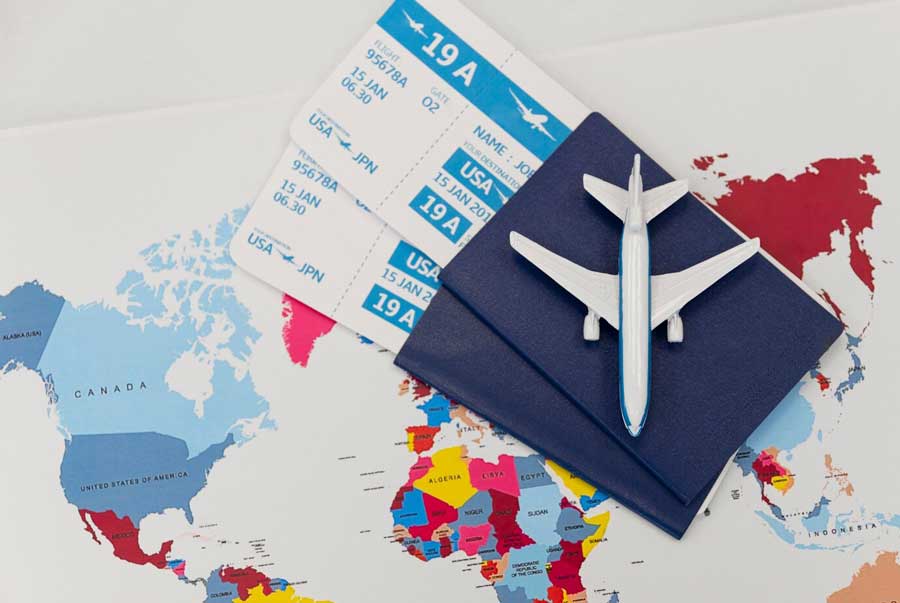The thrill of international travel, with its promise of new horizons, cultural exploration, and unforgettable experiences, is a dream shared by many. Yet, amid the excitement and anticipation, it’s essential to consider the practical aspects of ensuring a safe journey. One such critical aspect is insurance for international travel. In this comprehensive guide, we will explore the various facets of travel insurance, providing valuable insights and considerations to help you make informed decisions and embark on your international adventures with confidence.
The Significance of Travel Insurance
Defining Travel Insurance
Travel insurance is a safeguard that offers financial protection and assistance during your travels. It is designed to cover a range of unexpected events, from trip cancellations and delays to medical emergencies and lost luggage. While not mandatory, it is a valuable tool that provides peace of mind, especially when exploring foreign lands.
The Unpredictability of Travel
International travel, as thrilling as it is, comes with a degree of unpredictability. Flights may be delayed, baggage could be misplaced, or you may encounter a medical emergency in a foreign country. Travel insurance acts as a safety net, ensuring that you are prepared for unexpected challenges.
Cultural and Linguistic Differences
Navigating the intricacies of a foreign culture and potentially overcoming language barriers can be challenging. When you add unforeseen events to the mix, the support offered by travel insurance becomes invaluable.
Types of Travel Insurance
When considering travel insurance, it’s crucial to understand the various types available to choose the one that best suits your needs.
1. Trip Cancellation and Interruption Insurance
This type of insurance covers non-refundable expenses in case you need to cancel or interrupt your trip due to unforeseen events such as illness, injury, or a family emergency. It reimburses you for prepaid expenses like flights, accommodations, and activities.
2. Medical Insurance
Medical insurance for international travel provides coverage for medical expenses incurred while abroad. It includes doctor’s visits, hospital stays, and emergency medical evacuation. Given the potential high costs of healthcare in some countries, this coverage is often considered essential.
3. Baggage and Personal Items Insurance
Baggage insurance safeguards your belongings in case they are lost, stolen, or damaged during your trip. It typically covers personal items, baggage delay, and the replacement of essential items.
4. Travel Delay Insurance
Travel delay insurance offers compensation for expenses incurred due to trip delays caused by factors beyond your control, such as weather-related disruptions or airline strikes. It helps with accommodation, meals, and transportation costs during the delay.
5. Emergency Assistance and Evacuation Insurance
This insurance covers the costs of emergency assistance, such as locating the nearest suitable medical facility, as well as emergency evacuations if needed. It’s particularly important for travelers venturing to remote or less-developed regions.
6. Adventure Sports and Activities Insurance
If your travel plans include adventurous activities like scuba diving, skiing, or extreme sports, this specialized insurance covers potential accidents and injuries related to these activities.
7. Rental Car Insurance
When renting a car abroad, rental car insurance provides coverage for damages and theft, ensuring that you are not held financially responsible for any mishaps.
8. Pre-Existing Medical Conditions Insurance
If you have pre-existing medical conditions, it’s vital to seek insurance that covers any related medical expenses or emergencies that may arise during your trip.
Factors to Consider When Choosing Travel Insurance
Selecting the right travel insurance policy can be a complex task. To make an informed decision, consider the following factors:
1. Destination and Activities
The destination and the activities you plan to engage in during your trip can significantly impact the type of insurance you need. For example, if you’re embarking on a hiking adventure in the Alps, adventure sports insurance is crucial, while a cultural city tour may require different coverage.
2. Trip Duration
The length of your trip also plays a role in determining the appropriate insurance. Longer trips may necessitate more comprehensive coverage, while shorter vacations may require less extensive policies.
3. Pre-Existing Medical Conditions
If you have pre-existing medical conditions, it’s essential to disclose them to your insurance provider. Some policies offer coverage for pre-existing conditions, while others may not.
4. Coverage Limits
Be sure to understand the coverage limits of your policy. These limits define the maximum amount the insurance will pay for various aspects, such as medical expenses or baggage loss. Ensure that the limits align with your needs and the costs associated with your destination.
5. Deductibles
Deductibles are the out-of-pocket expenses you must cover before the insurance starts to pay. Consider your comfort level with deductibles when choosing a policy.
6. Cost of the Insurance
While cost is an essential factor, it should not be the sole determining one. Weigh the cost of the insurance against the level of coverage it provides. Sometimes, spending a little more can save you significantly in the event of an emergency.
7. Provider Reputation
Research the reputation and customer reviews of the insurance provider. Ensure that they have a history of providing excellent service and reliable coverage.
The Claims Process
Understanding the claims process is as vital as purchasing travel insurance. It’s essential to know how to initiate a claim and the documentation required to support it. Be prepared to
provide evidence in the form of receipts, medical reports, and police reports in case of theft.
Travel Insurance Tips and Considerations
To ensure you get the most out of your travel insurance, consider the following tips:
1. Read the Fine Print
Carefully read the policy details, paying attention to exclusions and conditions. This will help you understand what is covered and what is not.
2. Keep Records
Maintain records of all travel-related expenses, from flight tickets and hotel reservations to meal receipts and medical bills. These will be essential for filing a claim.
3. Contact Your Insurer
In the event of an incident that requires a claim, contact your insurer as soon as possible to understand the next steps and documentation requirements.
4. Emergency Contact Information
Always carry your insurance policy details and emergency contact information with you during your travels. Share this information with a trusted person back home.
5. Be Safe
The best way to make the most of your travel insurance is to stay safe during your travels. Take necessary precautions to minimize the risk of accidents or incidents.
The Future of Travel Insurance
As travel evolves, so does the landscape of travel insurance. With the rise of digital nomadism, remote work, and an increasing number of individuals exploring off-the-beaten-path destinations, the need for flexible and comprehensive insurance options is growing. The future of travel insurance may see more tailored policies to accommodate the evolving needs of travelers, including coverage for remote work-related incidents and digital nomad endeavors.
Conclusion: A Secure Journey Awaits
Travel insurance is your safety net when venturing into the unknown. While it may seem like an additional expense, it’s an investment in your peace of mind and financial security. The world is filled with incredible experiences and destinations, but it’s always wise to be prepared for the unexpected.
As you embark on your international adventures, remember that being well-informed about your travel insurance and choosing the right coverage will not only protect your pocket but also allow you to enjoy your journey with the assurance that you are prepared for whatever comes your way. Safe travels!








